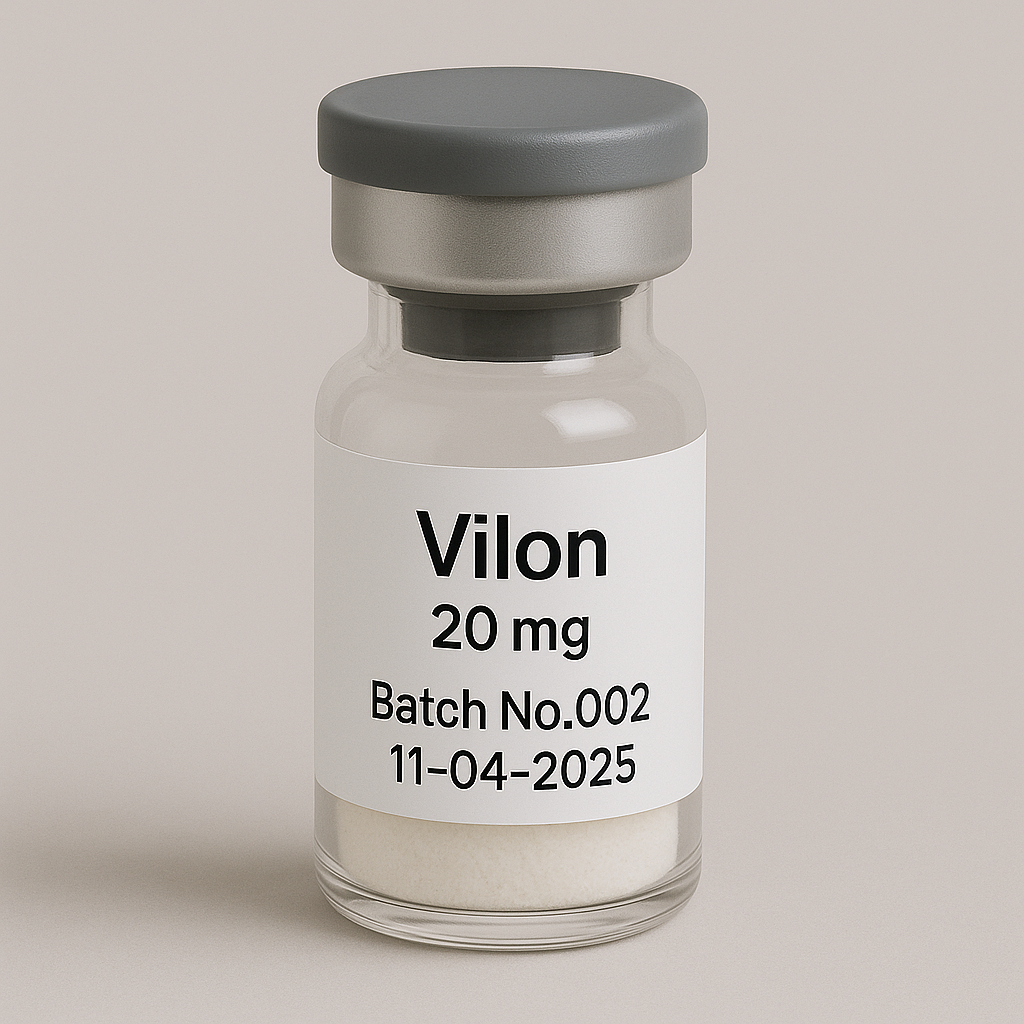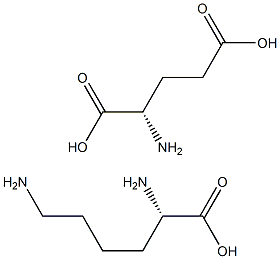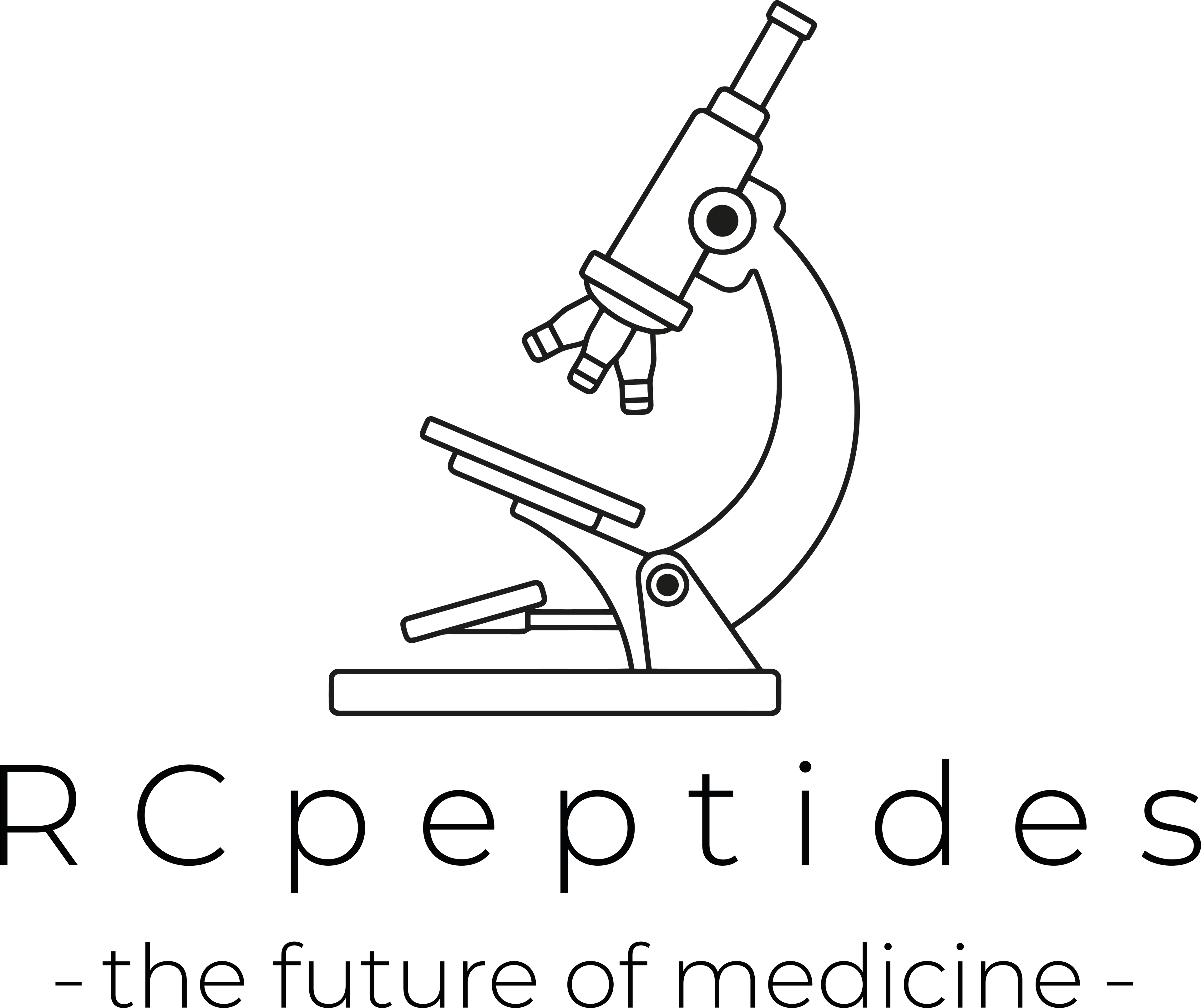
Vilon 20mg vial
Ritiro non disponibile al momento
NOT FOR HUMAN CONSUMPTION
Vilon is a synthetic dipeptide consisting of L-lysine and L-glutamic acid (Lys-Glu), developed by the St. Petersburg Institute of Bioregulation and Gerontology as part of a class of short peptides known as cytomedins or peptide bioregulators. These compounds are designed to mimic naturally occurring regulatory peptides extracted from mammalian tissues and are proposed to modulate gene expression, maintain cellular homeostasis, and delay organismal aging.
Vilon, specifically, has been primarily studied for its immunomodulatory, geroprotective, and oncostatic effects. It is commonly categorized as an immunopeptide, due to its targeted activity on thymic tissue, T-lymphocytes, and the broader immune system.
2. Molecular Mechanism of Action
2.1. Nuclear Signaling and Chromatin Remodeling
Vilon enters the cell and accumulates in the nucleus, where it exerts effects at the epigenetic level. Studies suggest it promotes chromatin deheterochromatinization—that is, it loosens tightly packed DNA within the nucleus, enhancing accessibility to transcriptional machinery. This results in:
-
Reactivation of silenced genes (including ribosomal RNA and cytokine genes)
-
Enhanced mRNA synthesis
-
Increased protein biosynthesis in senescent or stressed cells
This chromatin remodeling is central to Vilon’s proposed cell-rejuvenating properties.
2.2. Gene Expression Modulation
Vilon has been shown to increase the expression of key immune and regenerative genes, including:
-
IL-2 (a key regulator of T-cell proliferation and immune competence)
-
Genes for ribosomal components (enhancing protein synthesis)
-
Cell cycle regulators, which may explain effects on proliferation and regeneration in aged or damaged tissues
These effects are thought to mimic some aspects of thymic hormone activity, especially in aging immune systems.
2.3. Antioxidant and Anti-Inflammatory Activity
-
Reduces oxidative stress markers (e.g., ROS, lipid peroxidation)
-
Enhances antioxidant enzyme expression (e.g., SOD, catalase)
-
Modulates cytokine cascades, including downregulation of pro-inflammatory mediators like TNF-α
These mechanisms support its potential use in age-related diseases, chronic inflammation, and degenerative disorders.
3. Preclinical and Clinical Research Findings
3.1. Geroprotective and Anti-Aging Effects
Animal studies have demonstrated:
-
Lifespan extension of up to 25–30% in rodents
-
Delayed onset of age-associated tumors
-
Improved neuromuscular coordination and locomotor activity
-
Preservation of thymic structure and immune profile in aged mice
These results have been used to justify Vilon’s inclusion in anti-aging protocols in Russia and parts of Eastern Europe.
3.2. Immunostimulatory and Restorative Effects
Vilon has shown efficacy in:
-
Restoring immune function in aged and immunosuppressed animals
-
Stimulating T-cell differentiation and proliferation
-
Enhancing cytokine signaling in response to immune challenge (e.g., vaccination, infection)
Clinical studies (primarily in Russia) have reported benefits in:
-
Elderly patients with immunosenescence
-
Postoperative immune recovery
-
Chronic viral infections, including hepatitis and herpesvirus reactivation
3.3. Antitumor and Oncostatic Potential
-
Decreased incidence of spontaneous neoplasms in aging mice
-
Inhibition of tumor growth in transplantable murine tumor models
-
Suggested enhancement of immune surveillance mechanisms (e.g., NK cell activity)
Though preclinical data are compelling, controlled human trials in oncology are currently lacking.
4. Clinical Applications (Investigational and Off-label)
While not approved as a drug in the EU or US, Vilon is investigated or used (off-label or as a supplement) for:
| Indication | Proposed Role |
|---|---|
| Immunodeficiency (age-related, iatrogenic) | Immune recovery, T-cell support |
| Chronic infections | Immunoenhancement |
| Post-radiation and chemotherapy support | Protection of hematopoietic system |
| Geriatric and frailty syndromes | Improvement in vitality and systemic resilience |
| Preventive anti-aging regimens | Epigenetic reprogramming, oxidative stress reduction |
5. Safety, Pharmacokinetics, and Tolerability
5.1. Safety Profile
-
Excellent tolerability in rodents and human observational cohorts
-
No mutagenicity or genotoxicity reported
-
No evidence of immunogenicity or allergic sensitization
5.2. Pharmacokinetics
-
Administration: Intramuscular, sublingual, or oral (capsules)
-
Bioavailability: Oral bioavailability is limited; injection preferred for systemic effects
-
Metabolism: Degraded by peptidases into native amino acids (Lys, Glu)
-
Half-life: Short (minutes), but epigenetic effects may persist for days/weeks
6. Regulatory and Commercial Status
-
Not FDA-approved in the United States or EMA-authorized in Europe
-
Registered as a peptide supplement or therapeutic in Russia, Ukraine, and some CIS countries
-
Available as capsules or injectable vials, primarily for research or private clinical use
Given the lack of large, international Phase III clinical trials, Vilon remains unapproved in major pharmaceutical markets.
7. Conclusion
Vilon (Lys-Glu) represents an intriguing category of short-chain regulatory peptides with multifaceted biological effects. Its mechanisms—epigenetic modulation, immunostimulation, antioxidant action—support its investigation for aging, immunity, cancer prevention, and cellular rejuvenation. Preclinical data are robust and promising, but rigorous, placebo-controlled human trials are needed to fully validate its therapeutic potential and define optimal indications, dosages, and regimens.
Key References
-
Anisimov, V. N. et al. (2001). Vilon increases lifespan and reduces tumor frequency in mice. Mechanisms of Ageing and Development, 122(1), 41–68.
-
Khavinson, V. et al. (2013). Short peptides regulate gene expression and increase life span. Advances in Gerontology, 3(3), 497–502.
-
Lezhava, T. et al. (2004). Chromatin activation by Vilon in aged lymphocytes. Bulletin of Experimental Biology and Medicine, 137(4), 407–410.
-
Core Peptides. (2022). Vilon peptide and immune regulation research.
-
Khavinson Institute of Bioregulation and Gerontology. (2018). Peptide bioregulators in geriatric medicine.


